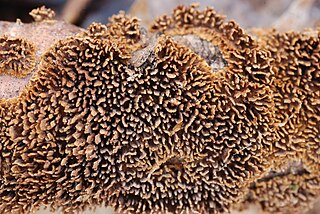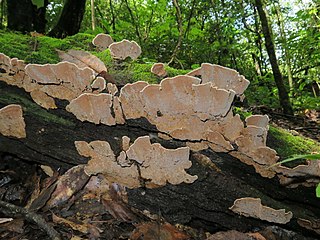
Plinia is a genus of flowering plants in the myrtle family, Myrtaceae described by Linnaeus in 1753. It is native to Central and South America as well as the West Indies.

Pseudochaete is a genus of green algae, in the family Chaetophoraceae. However, this genus is not recognized by all authorities, sometimes being considered part of genus Stigeoclonium.

Hubert Bourdot was a French Roman Catholic priest and mycologist who was a native of Imphy, a community in the department of Nièvre.

The Hymenochaetaceae are a family of fungi in the order Hymenochaetales. The family contains several species that are implicated in many diseases of broad-leaved and coniferous trees, causing heart rot, canker and root diseases, and also esca disease of grapevines.

Hydnochaete is a genus of hydnoid fungi in the family Hymenochaetaceae, order Hymenochaetales. All species are wood-rotting and produce brown to gray effused fruiting bodies. The genus is very close to Hymenochaete and can be considered its hydnoid counterpart.

Hymenochaete is a genus of fungi in the family Hymenochaetaceae. The genus has a widespread distribution, especially in tropical regions.

Opegrapha is a genus of lichenized fungi in the family Opegraphaceae.

Job Bicknell Ellis was a pioneering North American mycologist known for his study of ascomycetes, especially the grouping of fungi called the Pyrenomycetes. Born and raised in New York, he worked as a teacher and farmer before developing an interest in mycology. He collected specimens extensively, and together with his wife, prepared 200,000 sets of dried fungal samples that were sent out to subscribers in series between 1878 and 1894. Together with colleagues William A. Kellerman and Benjamin Matlack Everhart, he founded the Journal of Mycology in 1885, forerunner to the modern journal Mycologia. He described over 4000 species of fungi, and his collection of over 100,000 specimens is currently housed at the herbarium of the New York Botanical Gardens. Ellis had over 100 taxa of fungi named in his honor.

Amylostereum is the single genus in the fungal family Amylostereaceae. The genus currently comprises four saprotrophic and parasitic species, which live off living or dead wood. The Amylostereaceae cause white rot in the wood by disintegrating the tissue component lignin. They produce crust-like, partially wavy fruit bodies on the surface of infested trees, which are similar to those produced by Stereum species.

Hypocreopsis rhododendri is an ascomycete fungus. It is commonly known as hazel gloves due to the resemblance of its orange-brown, radiating lobular ascocarp to rubber gloves, and because it is found on hazel stems.

Hypocreopsis amplectens is part of the family Hypocreaceae and genus Hypocreopsis, a group of fungi that form ascomata on the stems of trees and shrubs. The ascomata are orange-brown and consist of radiating, perithecial lobes. This species of Hypocreopsis was only discovered in 1992 in Nyora (Victoria) during a botanical survey.

Xylobolus subpileatus is a widely distributed species of crust fungus in the family Stereaceae.











